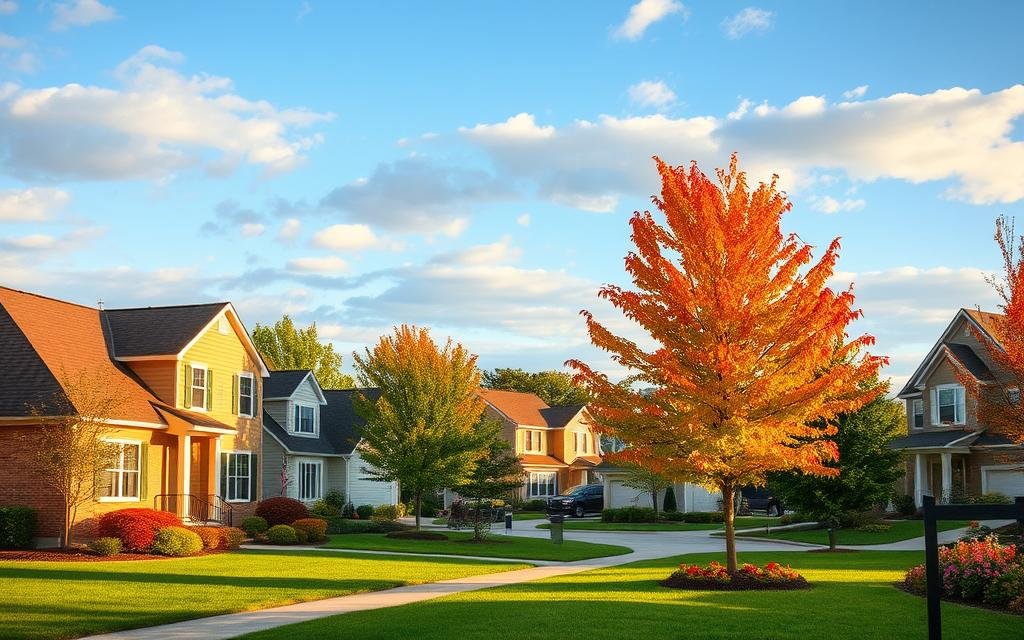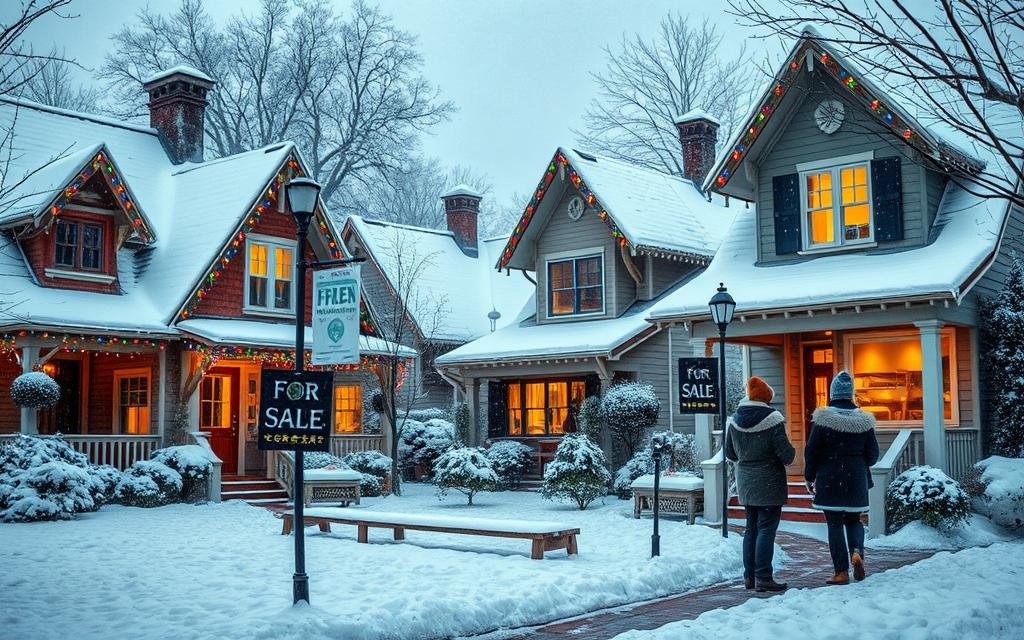Best Time to Buy a House: When to Get the Best Deal

The real estate world is always changing, making timing crucial for buying a house. When is the perfect moment to buy and get the best deal? I've learned that timing is key, influenced by supply, demand, and seller motivation.
While the "best" time to buy varies by individual, market trends offer clues. By studying the market's ups and downs, we can find the best times to get a great deal.
- Pros and Cons of Buying a House in Spring
- Advantages of Buying a House in Late Summer to Early Fall
- Winter: An Opportune Time for Bargain Hunters
- Best Time to Buy a House: Fall and Winter
- Best time to buy a house
- Seasonal Patterns and Mortgage Rates
- Strategies for Getting the Best Deal
- Considerations Beyond Seasonality
Pros and Cons of Buying a House in Spring
Buying a house in spring has its ups and downs. The warm weather and blooming flowers make it inviting. Plus, more homes come on the market, giving us more choices.
But, this also means more competition. This can lead to bidding wars and higher prices. It's a tough spot to be in.
Advantages of Spring Home-Buying
Spring has its perks for homebuyers. The weather is nicer, and homes look better with greenery and flowers. We also get to pick from a wider range of homes.
- Warmer weather and blooming landscapes create a more inviting atmosphere
- Increased inventory provides more options to choose from
- Homes often show better with improved curb appeal
But, the competition can be tough. Bidding wars and higher prices are common. We might have to act fast to get our dream home.
"The spring real estate market is a double-edged sword. While the increased inventory and pleasant weather can be advantageous, the heightened competition can also make it challenging to find and secure the right home at the right price."
Advantages of Buying a House in Late Summer to Early Fall
The late summer to early fall season offers unique benefits for homebuyers. One key advantage is the reduced competition among buyers. This makes it easier to find a home without the rush of the spring and early summer.
Reduced Competition
As summer ends, families focus on getting kids ready for school. This leads to a quieter market. Buyers face fewer bidding wars and more chances to negotiate. Sellers might also offer better deals to close sales before the year ends.
Moreover, fall brings discounts on big items like furniture and appliances. Prices for homes in the U.S. peak by the end of August, signaling a shift towards more favorable pricing for buyers as motivation for sellers increases.
"Between the months of September-November, big-ticket items like kitchen appliances and lawn equipment are typically on sale, presenting cost-saving opportunities for home buyers during the fall season."
By buying a house in late summer to early fall, buyers can get a better deal. They also enjoy a smoother home-buying experience with less competition.
Winter: An Opportune Time for Bargain Hunters
Winter brings a chill and fewer buyers, making it a good time to find a home. Sellers might be more willing to negotiate and accept lower offers. Houses that have been on the market for a while often see their prices drop as winter goes on.
Recent data shows December, January, and February are the best months to buy a house. Homes listed then usually take longer to sell and often have lower closing prices. This makes winter a great time for bargain hunting and finding a good winter home-buying deal.
- The housing market usually freezes over in the winter due to skyrocketing mortgage rates, indicating a moment for a possible drop in prices and good opportunities for bargain hunters.
- Over the years, December and January have typically signified less competition among buyers and motivated sellers due to holiday distractions and desperation to sell.
- Sellers with empty houses are more inclined to close deals quickly to avoid additional costs like heating and snow removal, making them more open to buying a house in winter.
While there might be fewer homes to choose from in winter, smart bargain hunters can still find great deals. By understanding the seasonal patterns and seller motivations, buyers can find a fantastic winter home-buying opportunity.
Best Time to Buy a House: Fall and Winter
Fall and winter are great times to buy a house. The real estate market slows down, but smart buyers can find deals. They can get a good price on their dream home.
Buying in these seasons means less competition. With fewer buyers, sellers might accept lower offers or give in to concessions. This can save buyers a lot of money.
Prices are also lower in the fall and winter. Sellers might price their homes lower to attract buyers. This is good for buyers who can wait for the right deal.
"Buying a house in the winter can lead to savings of thousands of dollars as a result of negotiating with more motivated sellers."
There might be fewer homes to choose from, but less competition helps buyers stand out. Also, seeing how a home handles cold weather can be useful.
Choosing the best time to buy a house depends on many things. But, fall and winter offer big savings and better deals. For those ready, these seasons are a great time to buy a house.
Best time to buy a house
Finding the best time to buy a house is complex. It depends on your finances, the market, and your housing needs. While some seasons might be better, the right time for you is unique.
Seasonal trends play a big role. The best time to buy a house in the U.S. is the week of Sept. 29-Oct. 5. During this time, buyers can save over $14,000 on a $445,000 home compared to summer prices.
The first week in October might see up to 37% more active listings than at the start of the year. This gives buyers more choices. But, buyer demand is lower in 2024 compared to the COVID-19 pandemic, reaching pre-pandemic levels, resulting in 29.5% lower demand during the best week to buy.
"The best time to buy a house ultimately depends on your personal circumstances and priorities."
Other factors like mortgage rates, inventory levels, and the housing market also matter. Knowing these can help you buy at the right time and price.
The best time to buy a house varies for everyone. It's about being financially ready, having a stable job, and knowing your housing needs. By keeping up with the market and your situation, you can make a choice that fits your goals.
Seasonal Patterns and Mortgage Rates
The real estate market often follows predictable seasonal patterns. Spring and summer months usually see a surge in home-buying activity. This shift in demand can also impact mortgage rates, as lenders adjust their offerings to meet the changing needs of buyers.
Spring and Summer Peaks
During the spring and summer home-buying peak, mortgage rates tend to be higher. This is because there is increased competition among buyers. Lenders raise rates to manage the influx of loan applications. On the other hand, the slower winter months may see lower mortgage rates. Lenders aim to attract buyers during the off-season by offering lower rates.
According to industry data, the "Best Time to Buy" a house in 2024 will be during the week of September 29 to October 5. Potential buyers during this period could save over $14,000 compared to summer's peak prices. They will also have up to 37% more inventory available.
"Demand is expected to be 29.5% lower than peak buying periods during the best week to buy, and the market pace is expected to slow by 34.8% compared to the peak earlier in the year."
These seasonal patterns in home-buying and mortgage rates can have a significant impact on the overall affordability and accessibility of the housing market. Understanding these trends can help buyers time their purchase to get the best possible deal.
Strategies for Getting the Best Deal
Getting the best deal on a home is not just about timing. There are many strategies to help you win in negotiations, no matter the season.
Working with a smart real estate agent is crucial. They know the local market well. They can tell you about average sale prices, how long homes stay on the market, and what sellers want.
Getting pre-approved for a loan is also key. It shows sellers you're serious and ready to buy. This can help you get better deals and act fast on good homes.
- Know why the seller wants to sell. Are they in a hurry or trying to make a lot of money? This info helps you make an offer that fits their needs.
- Don't be afraid to negotiate. The asking price is just a starting point. Use data from similar homes to make a strong counter offer.
- Look for homes priced lower than usual. Homes listed as "as-is" or with recent price drops might offer good deals.
By using these strategies, you can get a great deal on a home, anytime of the year.
"Negotiating a home-buying deal is like a carefully choreographed dance - you need to understand the steps, read your partner's cues, and be ready to lead or follow as needed."
Considerations Beyond Seasonality
While factors beyond seasonality in home-buying are important, other non-seasonal factors in home-buying matter too. Your financial situation, job stability, and future housing needs are key. Also, the overall economy, like mortgage rates and housing supply, affects the best time to buy.
By looking at the big picture, we can find the perfect home at the right time. For example, winter might seem like a good time to find deals. But today's high interest rates and low homes for sale might actually help certain buyers, like investors.
The ideal time to buy a house depends on our personal needs and money situation. By thinking about all the factors beyond seasonality in home-buying, we can make a smart choice. This choice will help us succeed in the housing market for the long haul.
If you want to know other articles similar to Best Time to Buy a House: When to Get the Best Deal You can visit the category Real Estate.



Deja una respuesta